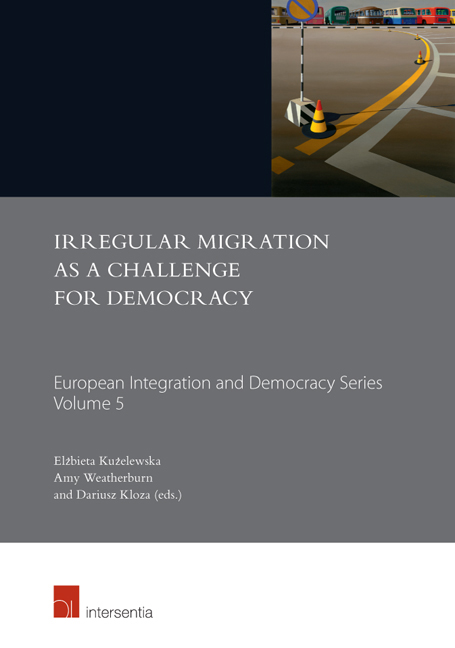Book contents
- Frontmatter
- Foreword
- Introduction
- Contents
- List of Abbreviations
- PART I The European Integration Project And Irregular Migration: Upholding Fundamental Values And Principles
- Part II Migrants, their Rights and the Limits Thereof
- Part III The Status Quo of Migration in Europe: Selected National Perspectives
- 10 The Governance of the Migrant Crisis in Italy (Invited Contribution)
- 11 The Impact of the Migration Crisis on Polish Immigration and Criminal Law
- 12 The Role of NGOs as Partners in Migration Management in Estonia: A Case Study
12 - The Role of NGOs as Partners in Migration Management in Estonia: A Case Study
from Part III - The Status Quo of Migration in Europe: Selected National Perspectives
Published online by Cambridge University Press: 12 October 2018
- Frontmatter
- Foreword
- Introduction
- Contents
- List of Abbreviations
- PART I The European Integration Project And Irregular Migration: Upholding Fundamental Values And Principles
- Part II Migrants, their Rights and the Limits Thereof
- Part III The Status Quo of Migration in Europe: Selected National Perspectives
- 10 The Governance of the Migrant Crisis in Italy (Invited Contribution)
- 11 The Impact of the Migration Crisis on Polish Immigration and Criminal Law
- 12 The Role of NGOs as Partners in Migration Management in Estonia: A Case Study
Summary
INTRODUCTION
The past two decades have seen an increasing role for civil society and non-governmental organisations (NGOs) in all stages of public policy-making. With the shift from government to governance and the growing importance of concepts like ‘trust’, ‘transparency’ and ‘openness’, governments have made efforts to improve the involvement of citizens and civil society organisations. There is a wide consensus in the literature that, in addition to democratic values, public participation in policy-making also provides instrumental benefits like wider evidence base for policy decisions, reduced implementation costs, potential for innovation, increased competence and greater trust in government. Since the end of the Second World War and especially in the post-Cold War era, NGOs have become key players in asylum policy by working closely with asylum seekers and refugees on the global and national level.
An asylum seeker is a person who has fled his or her home and submitted a request to be recognised as a refugee, but has not yet been granted that status. Asylum policy in the context of this chapter refers to the framework of procedures related to the reception of asylum seekers and the processing of their applications. It forms only one part of the government's overall refugee policy.
The right of asylum is a human right that is based on Article 14 of United Nations Declaration of Human Rights and the United Nations (UN) Convention of 1951 of Refugees. In many ways asylum seekers are one of the world's most vulnerable groups of people as they are ‘between states’ and ‘the only tangible right they can assert … is the right to seek asylum’. There have been claims that after the end of the Cold War, asylum policy in European countries has become pragmatic and state interests have become ‘dominant in comparison with human right protection’. In light of the current European migration crisis, this has become even more evident, as the influx of refugees has caused ‘growing fragmentation of member States’ national interests’ and a decrease in solidarity which poses a threat to the underlying values of the European Union (EU) and, in the Baltic States, also to the security of Member States.
- Type
- Chapter
- Information
- Irregular Migration as a Challenge for Democracy , pp. 227 - 256Publisher: IntersentiaPrint publication year: 2018

